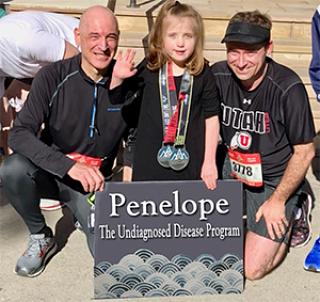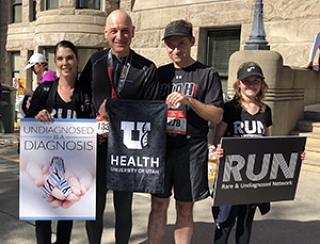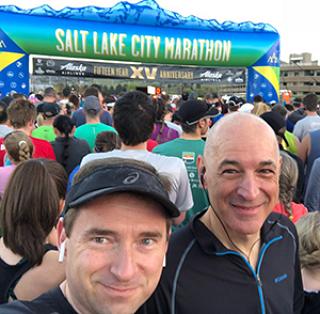
Author: Julie Kiefer
Penelope program helps patients through their journey of living with undiagnosed diseases
Heavy legs, shortness of breath, general discomfort. As a doctor for children with unusual diseases, Lorenzo Botto, MD, a pediatricic geneticist at University of Utah Health, is used to documenting odd collections of symptoms. But on this particular day the aches and pains are his, and they are self-inflicted.
At the finish line of the Salt Lake City Half-Marathon last Saturday, Botto was joined by his patient, nine-year-old Marley, and her father Steve Eliason, who also ran. Botto, who says he went "from couch to course in five weeks", put himself through a rigorous training program to raise awareness for their cause. At the end of the 13.1 miles, they were greeted with cheers and celebratory signs made by members of the Rare and Undiagnosed Network, an organization that supports the rare and undiagnosed disease community.
Out of necessity, this community is close-knit. Only they truly understand what it means to be a medical mystery. Patients bounce from doctor to doctor and are subjected to endless testing and ineffective treatments. They remain adrift in the health system for years as they journey through their “diagnostic odyssey,” searching for an answer to the cause of their illness. It’s not uncommon for that answer to take several years. Sometimes it never comes.
“I’ve gone through a tiny challenge compared to what these families face every day,” said Botto. “If I have to get down on my hands and knees I will do that as long as it helps the cause.”
In 2016, the Department of Pediatrics at University of Utah Health and Primary Children’s Hospital launched the Penelope program. Led by Botto, the program is dedicated to finding diagnoses for the undiagnosed. A rare collaboration in the medical world, multidisciplinary teams of clinicians from disparate specialties, including medical geneticists, comprehensive care doctors, nurses, and molecular geneticists, meticulously pore over the medical history, data, and presentation of each case. Like detectives, they retrace the history of each patient and look for clues that will lead them to the culprit behind each puzzling disease. Patients who meet set criteria are seen in a multidisciplinary clinic and have their DNA sequenced and analyzed by ARUP laboratories and the USTAR Center for Genetic Discovery.
After nine years of not knowing the reason for Marley’s severe disability, the Penelope program recently found the cause. Marley couldn’t sit until she was 18 months old, couldn’t walk until she was five years old, and is still severely developmentally delayed. Now her family knows the name of her condition, caused by a variation in her genetic code.
“We used to call her our beautiful mystery,” said Eliason. “Now we simply call her beautiful.”
Her disease cannot be reversed just yet, but now that they know what it is her doctors can tailor her treatments and therapies accordingly. The family has already connected to other families worldwide, finding strength, information, and hope in their newfound community. They are optimistic that with time her overall health and quality of life will improve.
Marley is one of 17 patients who have been diagnosed through the Penelope program so far, bringing the program’s success rate to 55 percent. While impressive, that means that nearly half their patients continue to navigate through their own odysseys. And reaching a diagnosis does not magically make everything better. Both the Penelope team and Marely’s parents know her journey is far from over. No matter where they are in their care, the Penelope clinicians are committed to this cause.
“Helping these families along their journey becomes a partnership,” says Botto. “We often become quite close.”
With the half-marathon behind him, Botto knows that compared to his patients he has it easy. On Monday, he and the Penelope team will get back to work to help each of them reach the finish line.
Related events:
"What is it like to live with a rare disease?"
On Friday, April 27 the University of Utah School of Medicine’s Pediatric Medicine Interest Group and the Rare and Undiagnosed Network (RUN) will hold an hour-long open event with speakers who will explain what it is like to live with a rare or undiagnosed disease. More information
Friday, April 27, 2018, noon - 1:00 PM
Spencer F. & Cleone P. Eccles Health Sciences Education Building (HSEB), Rm. 1730, University of Utah
Tunes for Tosh
5K or 1 Mile fun run on May 12th at Sugarhouse Park to support the Penelope program. Tosh is a child whose rare condition was diagnosed through Peneope program. Check in begins at 8:00 a.m., Race will begin at 9:00 a.m. This a kid friendly fun run. Bikes, scooters, and skateboards are welcome! Register here
Sat, May 12, 2018, 8:00 AM – 11:00 AM
Sugar House Park - Big Field Pavilion, 1330 2100 South, Salt Lake City, UT 84106


